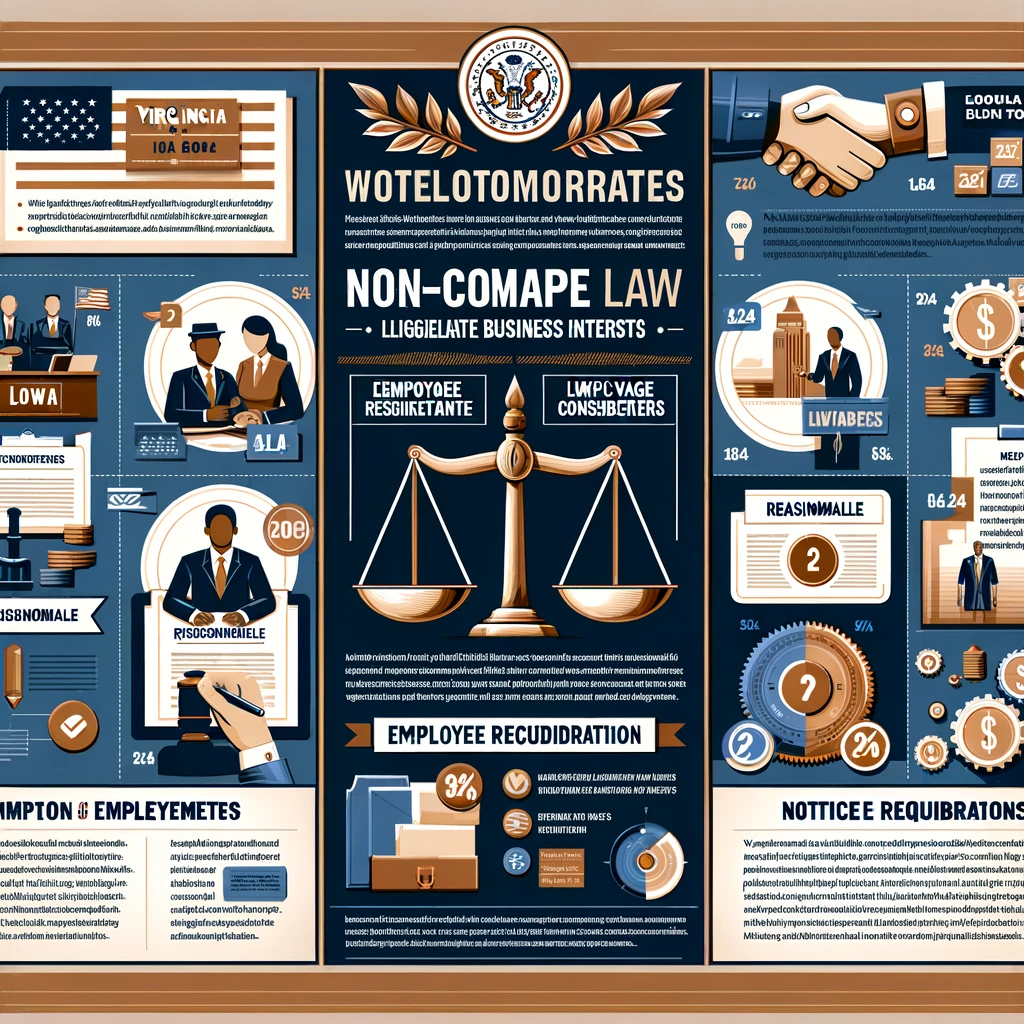Navigating Virginia's Non-Compete Law in 2024: A Strategic Guide for Employers and Employees
In the evolving landscape of employment law, non-compete agreements have been a point of contention, balancing the protection of business interests with the freedom of employees to change jobs and innovate. Virginia's approach to non-compete agreements has undergone significant scrutiny, leading to legislative changes aimed at creating a fairer job market. This comprehensive guide delves into Virginia's non-compete law as of 2024, offering insights for both employers and employees on navigating these complex regulations, enhanced with authoritative .gov, .edu, and Wikipedia links to ensure accuracy and reliability.

Understanding Non-Compete Agreements
Non-compete agreements, or covenants not to compete, are contracts that restrict an employee's ability to work in a competing business within a certain geographic area and time frame after leaving an employer. These agreements aim to protect employers' proprietary information and investments in employee training, but they must be balanced against an employee's right to employment mobility.
Virginia's Stance on Non-Compete Agreements in 2024
Virginia's non-compete law in 2024 reflects a nuanced understanding of the need to protect both business interests and worker rights. The state has implemented specific criteria that non-compete agreements must meet to be considered enforceable, focusing on reasonableness in scope, duration, and geographical limitations. For a deep dive into the legislation, the Virginia General Assembly provides comprehensive access to the state's statutes.
Key Provisions of Virginia's Non-Compete Law
Virginia's legislation on non-compete agreements includes several critical provisions:
Protection of Legitimate Business Interests: The law requires that non-compete agreements protect a legitimate business interest, such as trade secrets or substantial customer relationships.
Reasonableness: Agreements must be reasonable in terms of duration, geographic area, and the scope of prohibited activities. The University of Virginia School of Law offers resources on how "reasonableness" is interpreted in legal contexts.
Employee Consideration: Non-compete agreements must provide consideration (something of value) to the employee, beyond mere employment continuation.
Low-Wage Workers: Virginia's law prohibits the use of non-compete agreements for low-wage workers, ensuring that these employees retain their mobility in the job market. The definition of a low-wage worker is outlined on the Virginia Department of Labor and Industry website.
Notice Requirements: Employers are required to provide notice of the non-compete agreement to prospective employees or to current employees within a specified timeframe.
Implications for Employers
Employers in Virginia need to carefully draft and implement non-compete agreements to ensure they are legally enforceable. This involves:
Conducting a thorough analysis of the business interests being protected.
Ensuring that the scope, duration, and geographic limitations of the agreement are reasonable and necessary.
Being mindful of the law's provisions regarding low-wage workers and considering alternative protective measures, such as non-disclosure agreements (NDAs).
Implications for Employees
Employees should be aware of their rights and obligations under non-compete agreements. This includes:
Understanding the specific terms and conditions of any non-compete agreement before signing.
Being aware of Virginia's restrictions on non-competes for low-wage workers.
Seeking legal advice if unsure about the implications of signing a non-compete agreement.

Create & Review Your Contracts 10x Quality and Ease
Lawyer-level AI handles all your contract needs, with real lawyers providing safeguarding support

Navigating Non-Compete Agreements: Best Practices
For Employers
Regularly review and update non-compete agreements to comply with current Virginia law.
Consider the necessity of a non-compete agreement on a case-by-case basis, potentially opting for less restrictive measures like NDAs.
For Employees
Carefully review any non-compete agreement before signing and negotiate terms if necessary.
Consult with legal counsel to understand the potential impact on future employment opportunities.
Conclusion
Virginia's non-compete law in 2024 represents a careful balancing act between protecting business interests and ensuring employee freedom. By staying informed about the law and following best practices for drafting and agreeing to non-compete clauses, both employers and employees can navigate these agreements effectively. With the right approach, it's possible to safeguard proprietary information and business investments while preserving career mobility and innovation.

